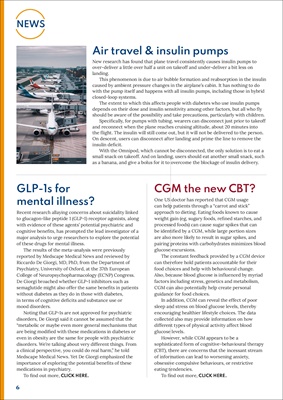
6
NEWS
Air travel & insulin pumps
New research has found that plane travel consistently causes insulin pumps to
over-deliver a little over half a unit on takeoff and under-deliver a bit less on
landing.
This phenomenon is due to air bubble formation and reabsorption in the insulin
caused by ambient pressure changes in the airplane's cabin. It has nothing to do
with the pump itself and happens with all insulin pumps, including those in hybrid
closed-loop systems.
The extent to which this affects people with diabetes who use insulin pumps
depends on their dose and insulin sensitivity among other factors, but all who fly
should be aware of the possibility and take precautions, particularly with children.
Specifically, for pumps with tubing, wearers can disconnect just prior to takeoff
and reconnect when the plane reaches cruising altitude, about 20 minutes into
the flight. The insulin will still come out, but it will not be delivered to the person.
On descent, users can disconnect after landing and prime the line to remove the
insulin deficit.
With the Omnipod, which cannot be disconnected, the only solution is to eat a
small snack on takeoff. And on landing, users should eat another small snack, such
as a banana, and give a bolus for it to overcome the blockage of insulin delivery.
GLP-1s for
mental illness?
Recent research allaying concerns about suicidality linked
to glucagon-like peptide 1 (GLP-1) receptor agonists, along
with evidence of these agents' potential psychiatric and
cognitive benefits, has prompted the lead investigator of a
major analysis to urge researchers to explore the potential
of these drugs for mental illness.
The results of the meta-analysis were previously
reported by Medscape Medical News and reviewed by
Riccardo De Giorgi, MD, PhD, from the Department of
Psychiatry, University of Oxford, at the 37th European
College of Neuropsychopharmacology (ECNP) Congress.
De Giorgi broached whether GLP-1 inhibitors such as
semaglutide might also offer the same benefits in patients
without diabetes as they do in those with diabetes,
in terms of cognitive deficits and substance use or
mood disorders.
Noting that GLP-1s are not approved for psychiatric
disorders, De Giorgi said it cannot be assumed that the
"metabolic or maybe even more general mechanisms that
are being modified with these medications in diabetes or
even in obesity are the same for people with psychiatric
disorders. We're talking about very different things. From
a clinical perspective, you could do real harm," he told
Medscape Medical News. Yet De Giorgi emphasized the
importance of exploring the potential benefits of these
medications in psychiatry.
To find out more, CLICK HERE.
CGM the new CBT?
One US doctor has reported that CGM usage
can help patients through a "carrot and stick"
approach to dieting. Eating foods known to cause
weight gain (eg, sugary foods, refined starches, and
processed foods) can cause sugar spikes that can
be identified by a CGM, while large portion sizes
are also more likely to result in sugar spikes, and
pairing proteins with carbohydrates minimizes blood
glucose excursions.
The constant feedback provided by a CGM device
can therefore hold patients accountable for their
food choices and help with behavioural change.
Also, because blood glucose is influenced by myriad
factors including stress, genetics and metabolism,
CGM can also potentially help create personal
guidance for food choices.
In addition, CGM can reveal the effect of poor
sleep and stress on blood glucose levels, thereby
encouraging healthier lifestyle choices. The data
collected also may provide information on how
different types of physical activity affect blood
glucose levels.
However, while CGM appears to be a
sophisticated form of cognitive-behavioural therapy
(CBT), there are concerns that the incessant stream
of information can lead to worsening anxiety,
obsessive compulsive behaviours, or restrictive
eating tendencies.
To find out more, CLICK HERE.